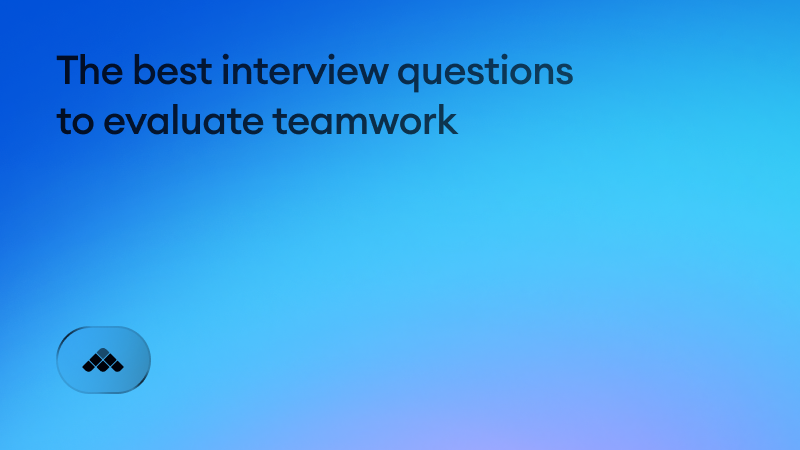Teamwork is one of the most vital skills to evaluate during the hiring process. Even the most talented individual can struggle to thrive if they can’t collaborate effectively with others.
Strong teamwork leads to smoother communication, better problem-solving, and stronger overall performance across the business. Employers seek candidates who not only possess individual skills but also excel in contributing to the collective success of the organization.
To help you assess this skill with confidence, we’ve pulled together the best teamwork interview questions. You’ll also get tips on what to look for in candidate responses, and how to evaluate them fairly.
Key takeaways
- Use structured questions to evaluate candidates’ ability to collaborate, communicate, and adapt in team settings.
- Look for evidence of conflict resolution, accountability, and role flexibility in candidate responses.
- Incorporate role-playing exercises and reference checks for deeper insights into teamwork capabilities.
Why teamwork matters
No role exists in a vacuum. And no individual performer is more important than the collective. Whether you’re thinking of engineers working cross-functionally with product managers, recruiters partnering with hiring teams, or sales reps coordinating with marketing, the ability to collaborate is central to success.
When candidates demonstrate strong teamwork, they bring more than just technical skills. They contribute to culture, foster trust, and help raise the bar for peers.
On the flip side, poor teamwork often leads to miscommunication, missed goals, and low morale. That’s why hiring managers place so much emphasis on evaluating collaboration skills during interviews.
Teamwork interview questions
These are some of the most effective questions you can use to understand how candidates approach collaboration. They’ll help you uncover how individuals contribute to team success, handle conflict, and support colleagues.
- Can you describe a time when you worked successfully within a team?
- How do you handle conflicts or disagreements within a team?
- What role do you typically play in team projects?
- Can you give an example of how you have contributed to a team’s success?
- How do you ensure effective communication when working with team members?
- Describe a situation where you had to collaborate with a difficult team member.
- How do you prioritize tasks when working on a team project?
- What mechanisms do you use to motivate yourself and your team?
- How do you handle receiving feedback from team members?
- Can you share an experience where your team did not meet its objectives? What did you learn?
What to look for in answers
Great teamwork is about communication, accountability, and adaptability. Here’s what to pay attention to in candidate responses to ensure you’re identifying the right skills.
- Demonstrated collaboration skills: Look for examples where the candidate actively contributed to team goals and supported their teammates.
- Conflict resolution abilities: Assess how the candidate manages disagreements and seeks amicable solutions.
- Role flexibility: Identify if the candidate can adapt to different roles as needed within a team setting.
- Effective communication: Evaluate the candidate’s ability to convey ideas clearly and listen to others.
- Problem-solving skills: Notice how the candidate approaches challenges and contributes to overcoming obstacles.
- Accountability and reliability: Ensure the candidate takes responsibility for their tasks and dependably follows through.
- Positive attitude: A candidate’s enthusiasm and willingness to collaborate can greatly enhance team dynamics.
- Learning from experiences: Look for reflections on past team experiences that show growth and adaptability.
Tips for evaluating teamwork during the hiring process
Asking the right questions is only half the battle. To truly assess teamwork, you need to structure your evaluation process carefully. These tips will help you reduce bias, gather better evidence, and make more consistent hiring decisions.
- Assess soft skills: Pay attention to the candidate’s communication, empathy, and interpersonal skills, as these are critical for effective teamwork.
- Involve multiple interviewers: Having more than one interviewer assess the candidate can provide diverse perspectives on their teamwork abilities and ensure a more balanced evaluation.
- Role-playing exercises: Engage candidates in simulated team scenarios to observe their collaborative behavior and problem-solving in real-time.
- Check references: Speak with previous employers or colleagues to gain insights into the candidate’s teamwork capabilities and how they function within a team.
- Evaluate cultural fit: Consider how the candidate’s teamwork style aligns with your organization’s culture and the existing team dynamics.
- Look for consistency: Ensure that the candidate’s examples of teamwork are consistent with their resume and other parts of the interview, indicating reliability in their claims.
Take teamwork seriously during job interviews
Evaluating teamwork is too important to leave to gut feel. By using structured interview questions, knowing what to listen for in candidate responses, and applying consistent evaluation practices, you're better equipped to hire people who lift others up and thrive in collaborative environments.
Use the questions and tips above as part of a structured process, and you’ll consistently identify candidates with the teamwork skills your organization needs.
Want the best AI recruiting tools to manage candidate interviews? Try Metaview for free today.


